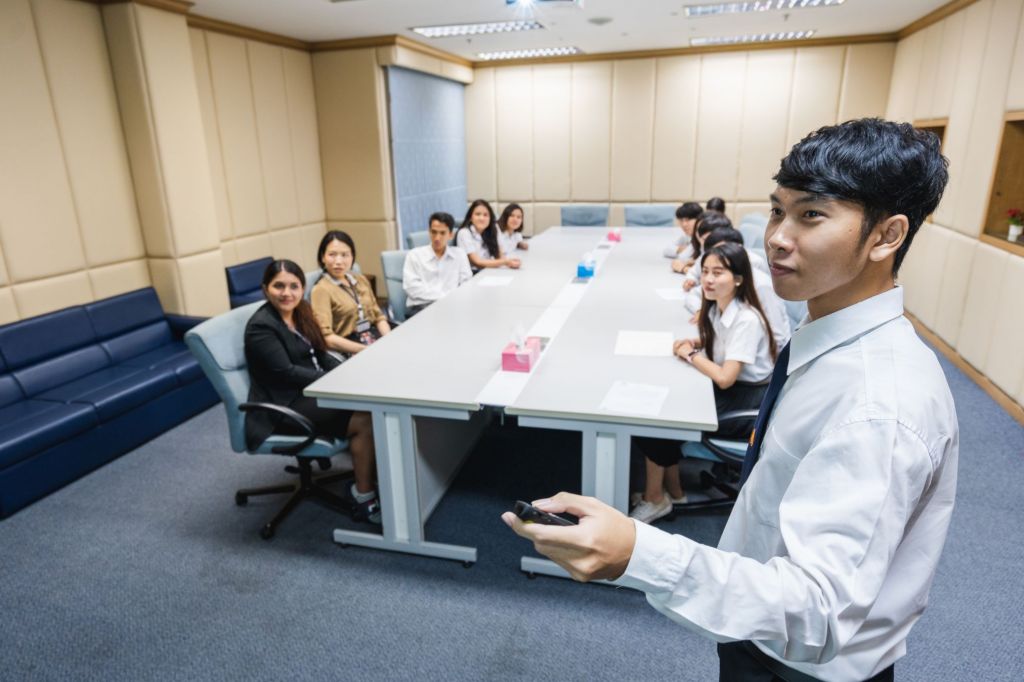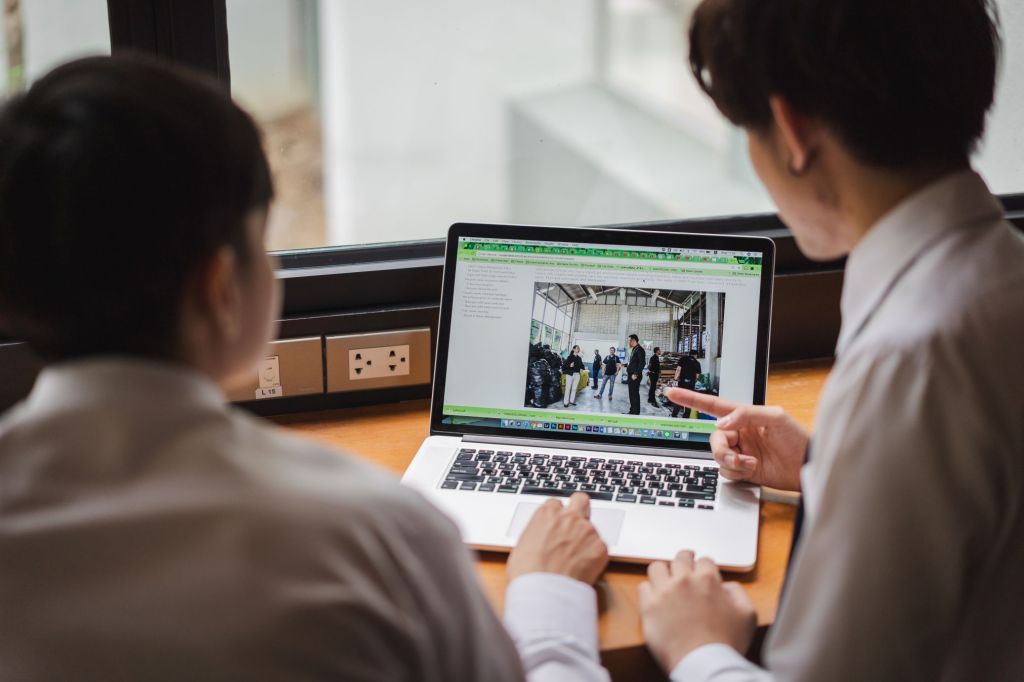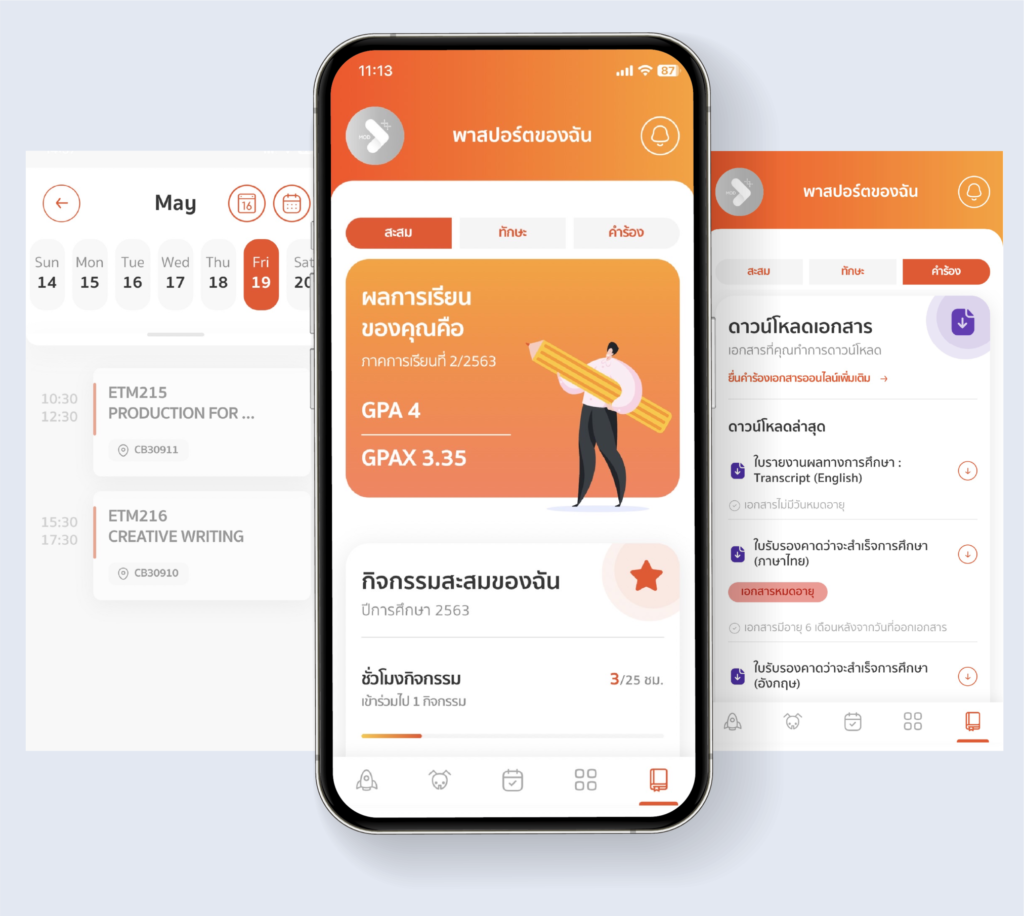Paper Reduction Programs at KMUTT
Goal: To be paperless campus
Target: Reduction of 80% in Paper Usage by 2024 compare to 2016 baseline
Current Status: In 2024, reduction of 44.27% in paper usage compare to 2016 baseline
KMUTT’s Path to a Paperless Campus: Embracing Digital Transformation for Sustainability
Since launching its paper reduction program in 2016, KMUTT has pursued a bold goal: to become a fully paperless campus. By harnessing digital platforms for government documents, learning materials, and administrative processes, the university has successfully transformed how students and staff access information, communicate, and complete tasks. In 2024, KMUTT students can download handouts and past exam papers on the university’s e-Learning website, manage academic records securely via KMUTT’s blockchain system, and submit assignments through platforms like Google Drive and OneDrive. These digital tools not only improve accessibility and efficiency but also advance KMUTT’s vision of becoming a smart and sustainable university. Reducing paper usage has proven to save time, cut costs, and minimize environmental impact. Here are the key activities supporting KMUTT’s paper reduction efforts:
Metaverse for Virtual Events and Exhibitions
Embracing the cutting-edge, KMUTT now uses the Metaverse to host virtual exhibitions and events for students, staff, and even external participants. The Metaverse blends real-world environments with immersive virtual spaces, allowing users to interact through 3D avatars, creating a realistic and engaging experience beyond traditional social media. This virtual approach to events not only reduces the need for printed materials but also expands the reach and inclusivity of KMUTT’s events.
E-Meeting Document System
With the integration of an e-meeting document system, KMUTT has reduced paper usage by over 776,312 sheets annually. Conference materials and meeting reports are shared online, eliminating the need for printed copies and transforming KMUTT into a “smart office” environment. This shift also enables easier access and retrieval of documents, contributing to a more efficient workplace.
E-Procurement and E-Bidding
KMUTT has digitized its procurement processes, reducing paper waste through e-procurement and e-bidding systems. Suppliers can submit bids and documents electronically, which not only reduces paper usage but also promotes transparency and minimizes the risk of corruption. The streamlined process saves time and resources, setting a new standard for sustainable procurement.
Blockchain Integration for Academic Records
Through KMUTT’s blockchain system, private and public sectors can securely access verified student data without requiring physical copies. This innovation eliminates the need for hard-copy transcripts and certificates, ensuring secure and transparent data management and supporting a paperless future for student record-keeping.
Double-Sided Printing with Monochrome Laser Printers
Since 2014, KMUTT departments have adopted double-sided printing using monochrome laser printers. This shift to 2-sided printing significantly reduces paper and toner consumption, saving costs in the long run and supporting KMUTT’s commitment to resource efficiency.
E-KMUTT and Office 365 for Digital Learning Resources
All lecture materials, assignments, and even final theses are now available in digital formats, accessible to students on KMUTT’s Office 365 and e-KMUTT platforms. E-books and online resources reduce the need for physical library visits, allowing students to access information anytime, anywhere, and contributing to a more sustainable academic environment.
CEGIS: A Community Engagement Information Hub
The Community Engagement Geographic Information System (CEGIS) provides an online database where users can explore KMUTT’s community projects from the past 10 years. This digital resource supports further research and development while reducing paper use in community engagement documentation.
Metaverse for Virtual Events and Exhibitions
Embracing the cutting-edge, KMUTT now uses the Metaverse to host virtual exhibitions and events for students, staff, and even external participants. The Metaverse blends real-world environments with immersive virtual spaces, allowing users to interact through 3D avatars, creating a realistic and engaging experience beyond traditional social media. This virtual approach to events not only reduces the need for printed materials but also expands the reach and inclusivity of KMUTT’s events.
Digital Student ID and Payment System
KMUTT can further implement a digital student ID and payment system. Students could access their ID cards digitally through a mobile app instead of using plastic cards and make payments via an integrated digital payment system for various services on campus, such as purchasing food or accessing facilities. This approach helps reduce the need for plastic cards and paper receipts, aligning with a paperless vision.
Cloud Storage for Personal and Academic Use
Encourage students and staff to use cloud storage services (such as Google Drive, OneDrive) for storing personal documents, research, and academic papers, reducing the need for paper in document storage. Cloud storage also allows easy access to important files from anywhere, preventing the loss of essential documents.
QR Codes for Event Information and Announcements
Instead of printing paper leaflets or posters, KMUTT can use QR codes for event promotions and announcements. Students can scan QR codes to access event details, schedules, or links to additional information on their mobile devices. This approach reduces paper use for marketing materials and suits today’s digital age.
Online Forms and Digital Signatures
Implement online forms and electronic signatures (e-signatures) for all administrative processes, such as admission applications, document approvals, and form submissions within and outside the university. This method minimizes paper use and speeds up approvals, making administrative tasks more efficient.
Digital Notice Boards and Interactive Screens
Install digital notice boards and interactive screens in key areas around campus, such as entrances to lecture halls, cafeterias, and dormitories, for announcements and information sharing instead of paper-based bulletin boards. Students can easily access relevant information, and updates can be made in real-time, reducing the need for printed materials.
AI-Based Document Digitization
Use artificial intelligence (AI) technology to scan and convert paper documents into digital files, such as scanning books, lecture notes, or research documents, and storing them in the cloud for easy access by students and staff. This method reduces the need for paper and modernizes old documents, making them more accessible.
Paperless Labs for Research and Experiment Documentation
Encourage research labs within KMUTT to use digital devices, such as tablets, for recording research and experiment results instead of paper. These records can be stored systematically and securely and can easily be connected to the cloud, making data recording more sustainable and accessible.
Mobile Application for Campus Services and Scheduling
Develop or utilize a mobile application for various campus services, such as booking meeting rooms, registering for events, or scheduling appointments. This method reduces the paper typically used for booking confirmations and event registrations, allowing students and staff to access services more conveniently and efficiently.



MOD LINK: A Key Tool for Reducing Paper Usage at KMUTT
MOD LINK is a comprehensive digital platform developed by King Mongkut’s University of Technology Thonburi (KMUTT) to enhance student and staff experiences while supporting the university’s sustainability goals. By providing a variety of essential services in a single application, MOD LINK significantly reduces the need for paper-based processes. Key features include:
- E-Student Card – A digital student ID for easy access and identity verification.
- Academic and Activity Tracking – Students can check grades, schedules, and activity hours, eliminating the need for printed transcripts or activity records.
- Document Download – Quick access to academic documents, reducing paper requests.
- Digital Payments – Online fee payment options to replace paper-based payment receipts.
- Online Reservations and Assessments – Event reservations and activity assessments are fully digital, minimizing printed forms.
MOD LINK contributes to KMUTT’s vision of a paperless campus by providing digital solutions for academic and administrative needs, promoting convenience and environmental responsibility.


